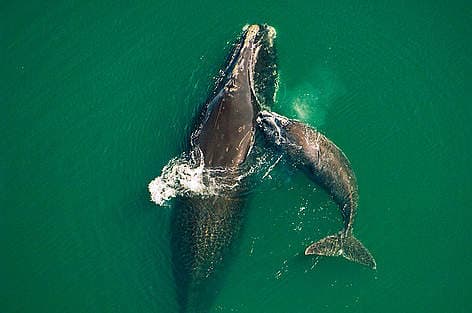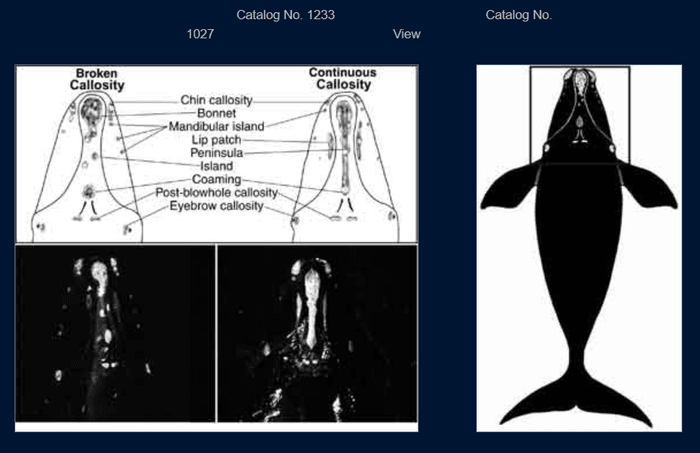NOAA Set To Launch Face Detection Software To Identify Right Whales
The National Oceanic and Atmospheric Administration (NOAA), USA is all set to launch a facial detection software to identify right whales. NOAA along with Mathworks put forward a competition on Kaggle, a data science venture for enthusiasts to develop a software that can rightly detect “right whales†and uniquely identify them. The competition ended on 7th January, 2016 and the data was recorded to be published as a press release.
Christin Khan, a member of NEFSC, under NOAA, works on aerial surveys that capture snapshots of whales from the top, said that identifying whales using mere photography was tedious and there was a high chance of error. To overcome the problem, the NOAA decided to use the technique of facial recognition.

The underlying principle behind the face recognition software was to uniquely categorize callosities or lice patterns. The challenge for data scientists was to automate the right whale recognition process by using given datasets of aerially photographed whales. After a 4-month period, deepsense.io, a software engineering firm overpowered other competitors and grabbed the $10,000 prize. Polish creator Robert Bogucki explained that his team’s whale algorithm would need more data points to improve its precision as the dataset only had 4500 whale photographs.

Right whale identification
Christin claimed that the software would be incorporated in their searching methods within the next two years. This new advancement in their searching technique would definitely enhance the identification process of endangered whales.
Watch Right whale "Calvin" with her calf -
Source: Right Whale Recognition | Kaggle | #-Link-Snipped-#
Christin Khan, a member of NEFSC, under NOAA, works on aerial surveys that capture snapshots of whales from the top, said that identifying whales using mere photography was tedious and there was a high chance of error. To overcome the problem, the NOAA decided to use the technique of facial recognition.

Mother right whale with her calf
Right whales are identified as an endangered species in their North Atlantic habitat. With less than 500 whales, it is crucial to properly label each one so that the total count can be constantly monitored along with their individual health. According to the press release, it is very difficult for even the most experienced researchers to tell whales apart simply by seeing them. Whale faces bear strikingly similar features, among them right whales are those which have raised tissues, dubbed as callosities on top of their heads.
The underlying principle behind the face recognition software was to uniquely categorize callosities or lice patterns. The challenge for data scientists was to automate the right whale recognition process by using given datasets of aerially photographed whales. After a 4-month period, deepsense.io, a software engineering firm overpowered other competitors and grabbed the $10,000 prize. Polish creator Robert Bogucki explained that his team’s whale algorithm would need more data points to improve its precision as the dataset only had 4500 whale photographs.

Right whale identification
Christin claimed that the software would be incorporated in their searching methods within the next two years. This new advancement in their searching technique would definitely enhance the identification process of endangered whales.
Watch Right whale "Calvin" with her calf -
Source: Right Whale Recognition | Kaggle | #-Link-Snipped-#
Replies
-
 Christin KhanI just wanted to correct an error: "but would also help to combat against poachers."
Christin KhanI just wanted to correct an error: "but would also help to combat against poachers."
Right whales are heavily protected in the US waters and not subject to poaching or hunting of any kind. They are threatened by accidental human related mortality in vessel strike and entanglement in fishing gear.
Would really appreciate it if you are able to correct, thanks!
Christin Khan -
 Ankita KatdareHello #-Link-Snipped-# Thanks for correcting. It has now been edited.
Ankita KatdareHello #-Link-Snipped-# Thanks for correcting. It has now been edited. -
 Debasmita BanerjeeHi #-Link-Snipped-#
Debasmita BanerjeeHi #-Link-Snipped-#
Thank you for pointing out the mistake. I would like to request you to update this thread with the advancement of face recognition in whale detection. It will be great to know about your experience and work regarding this matter. Welcome to CrazyEngineers.
You are reading an archived discussion.
Related Posts
hello everyone i am akash previously i worked as a erection n planning engineer for a power plant in odisha. i completed my B.Tech in EEE and pursued job in...
Former ISRO chief, K Kasturirangan proclaimed that outlining of a strategy is an integral part of the Indian Space program, for the sake of long term sustainability. India has been...
Project Abstract / Summary : SUMMARY : This project explains the deflection and failures in the beams and concrete slabs.the failures in the concrete structures due to deflection bye the...
Hi,
IIT Delhi / DTU conduct their own Entrance exam for MTech for part time candidates.
Can you help with the syllabus of these entrance exams ? Looking for EC...
In Cambridge, Massachusetts, Harvard University’s John A. Paulson School of Engineering and Applied Sciences (SEAS), Center for Brain Science (CBS) and Department of Molecular and Cellular Biology will collaborate to...
